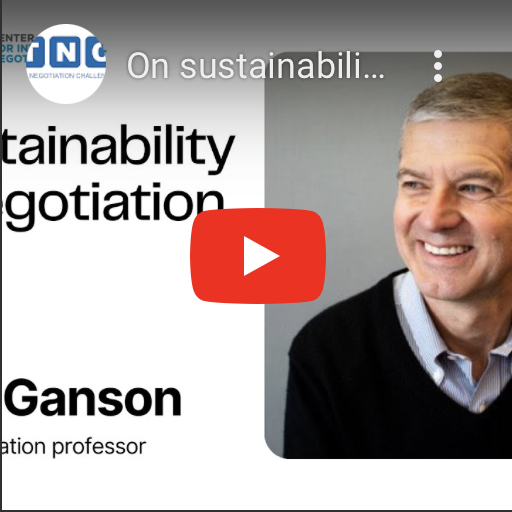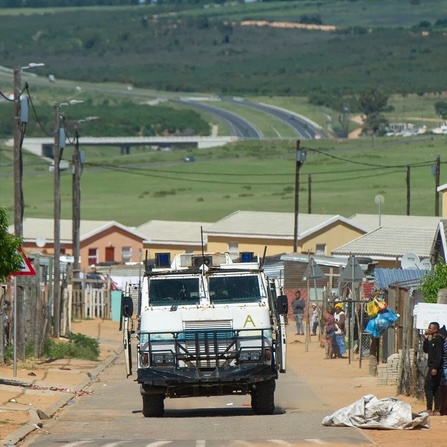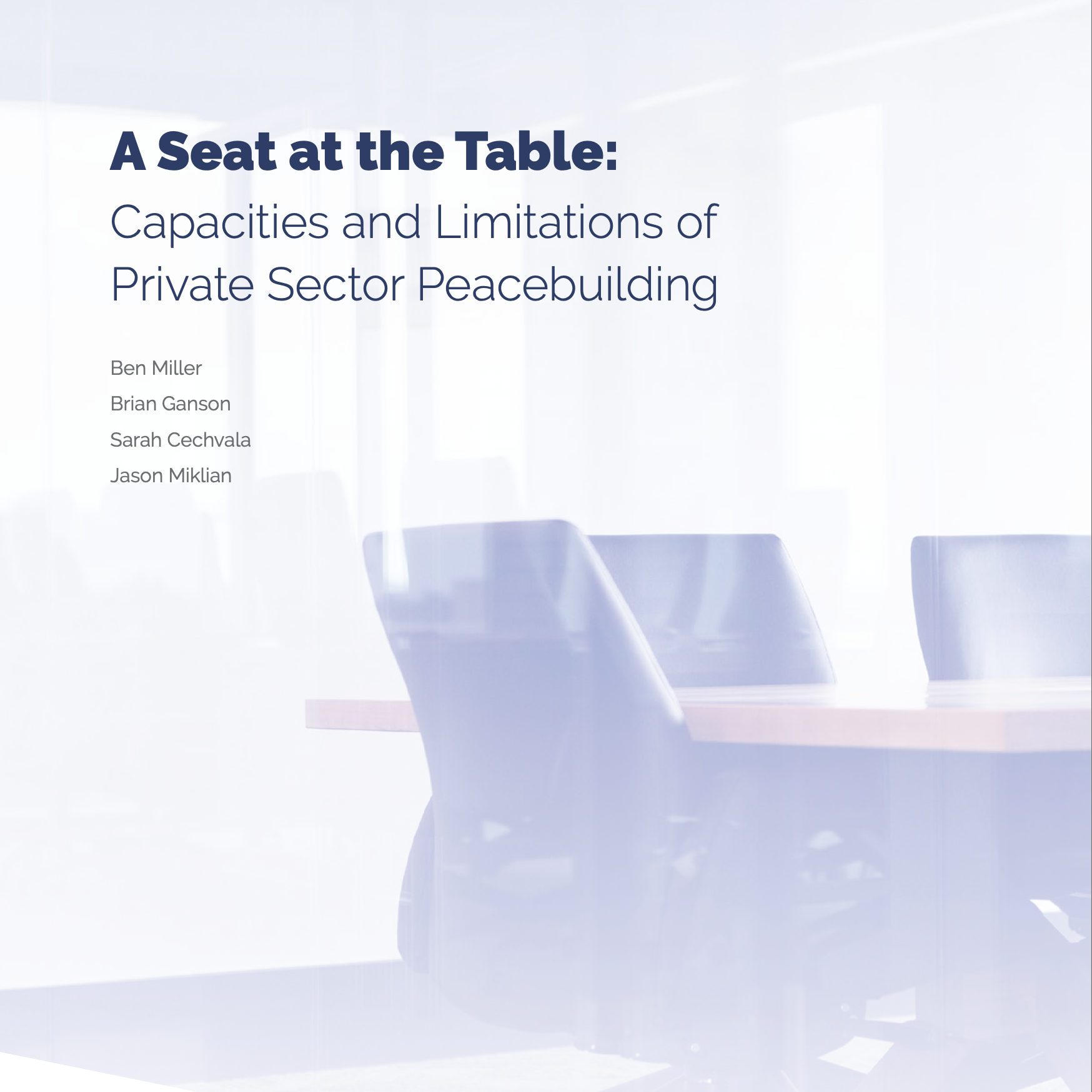Professor Brian Ganson
is an expert on socio-political risk mitigation, conflict prevention and resolution, and third-party roles in post-conflict and other complex environments. His research, consulting, and teaching focus on the nexus of the private sector, conflict and peace, and human security. His work is rooted in deep commitment to human rights, sustainable development, and collaborative problem solving.
Current affiliations
Professor and Head, Centre on Conflict & Collaboration, Stellenbosch Business School
Professor, School for Data Science & Computational Thinking, Stellenbosch University
Research Professor, Peace Research Institute Oslo
Leadership Council Member, Cambridge Initiative on Peace Settlements, University of Cambridge
Research Associate, Center on Conflict, Development & Peacebuilding, The Graduate Institute Geneva
Senior Fellow, Council on Emerging Market Enterprises, The Fletcher School, Tufts University
In this podcast by the Center for International Negotiation, we explore the intersection of sustainability with negotiation theory and practice, arguing for greater attentiveness to the interests of those not at the table
New work establishes the exacerbation of social conflict and violence caused by commercial scale solar installations in fragile contexts, necessitating greater attentiveness to conflict risk assessment and mitigation measures
Peaceful societies require markets. But how do we avoid the negative consequences of business in fragile contexts? The Network for Business Sustainability explores ways businesses contribute to conflict—and peace
This policy and practice brief applies a peacebuilding lens on private sector development to illuminate the roles, resources, capabilities—and courage—that enable business to help facilitate peaceful and inclusive development

Consulting
Prof Ganson advises senior leaders and policymakers in companies, governments, international organisations, and civil society on complex conflict dynamics. He helps them to assess and to improve organisational systems and processes for socio-political risk identification, conflict prevention, monitoring and evaluation, and dispute resolution in tumultuous and often enough violent socio-political contexts.
Illustrative Private Sector Engagements
Led planning, monitoring and evaluation efforts for a multi-year effort to build company, community and government capacity for collaborative action on issues of peaceful development in an industrial area of one of the most violent municipalities in Brazil
Advised a multinational agribusiness company on internationalised and localised risks to their license to operate in various African markets through stakeholder and issue mapping, introducing frameworks of conflict sensitivity and “do no harm” into corporate governance systems
Co-led with Mary B. Anderson a review of the operations of the Yadana Pipeline in Myanmar / Burma during a period of intense political upheaval. This study assessed the interrelationships among corporate operations and social conflict at the local and national levels
Illustrative Intergovernmental Organisation Engagements
As Chair of the Expert Panel for the evaluation of the work of the Food and Agriculture Organization of the United Nations in post-crisis transition, helped to strengthen linkages among emergency, rehabilitation and development in the agricultural sector in Africa
Expert Advisor to the United National Develop Program on its extractive sector strategies in Africa, helping to strengthen conflict sensitivity in the implementation of the Africa Mining Vision
Led management section of the Independent Review of the United Nations Mission / United Nations Development Program Disarmament, De-mobilization and reintegration program in Sudan. The review focused on program relevance, efficiency and effectiveness in light of the evolving socio-political context, with special reference to program governance, management and leadership
Illustrative Development Finance Institution Engagements
Led the African Development Bank sponsored review of the drivers of the social, political, and economic drivers of the persistence of fragility in the Mano River Union region, with implications for national and international actors
Advised the International Finance Corporation on conflict risks within its Africa portfolio as well as on approaches to conflict-sensitive project assessment and oversight as it expands its project finance reach in Africa
Led the evaluation in South Africa for the International Finance Corporation of the 2030 Water Resources Group hydro-economic analysis and multi- stakeholder platform, helping to improve multi-stakeholder approaches to water issues in South Africa
Illustrative Civil Society Engagements
Independent evaluator for the Decenial Review of Hand in Hand Eastern Africa. The evaluation helped to better position the organisation to consider and navigate the political economy of underdevelopment, and to design improved systems for monitoring and evaluation of its ultimate impact
Led evaluation of Partners for Peace in the Niger Delta, helping a grassroots volunteer-led peacebuilding organisation improve its strategic and capacity building planning for conflict prevention, resolution and transformation in Nigeria
Team Leader for the Decennial Review of Conciliation Resources. The evaluation, with a particular focus on Sierra Leone and Georgia / Abkhazia, helped strengthen program design, monitoring and evaluation to maximize cumulative peace building impact, considering in particular the respective roles of donor organizations and CR in defining, pursuing, and demonstrate value
Illustrative Government Engagements
Advisor to the South African government in its role as member of the United Nations Peacebuilding Commission on pathways of private sector development, conflict, and peace
Co-led research and policy recommendation development in a study for the UK Department of International Development to improve international policy and aide programming related to business environment reform in fragile and conflict affected states
Team Leader for the Swiss Federal Department of Foreign Affair’s five-year review of its peace mediation strategies and programmes. The evaluation focused on strategies for engagement, influence and impact with internal and external stakeholders
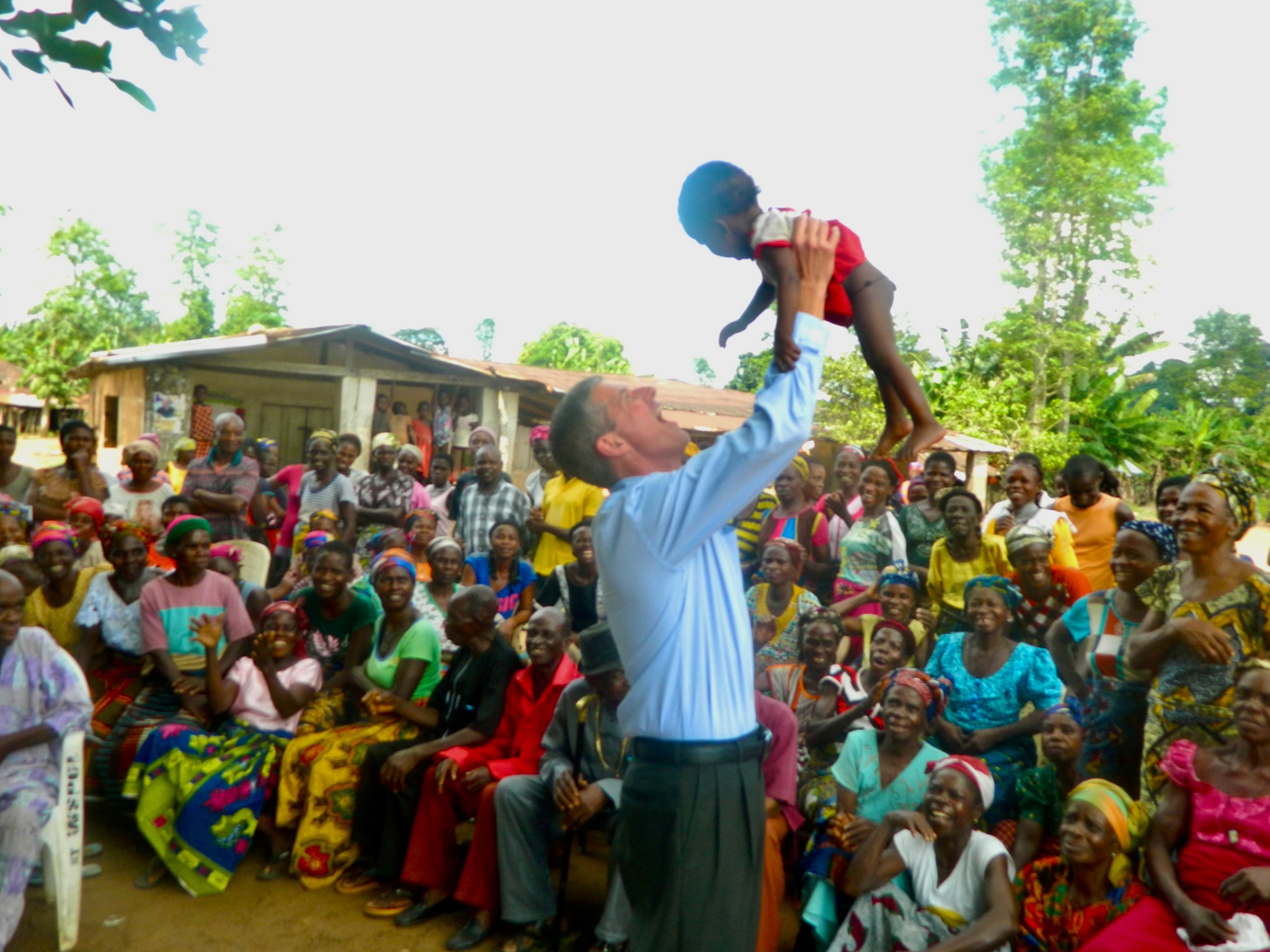
Research
Prof Ganson integrates academic and field perspectives to provide practice- and policy-relevant insight. He has co-authored (among other works) the books, Business & Conflict in Fragile States and Management in Complex Environments; articles in the Academy of Management Review, Journal of Business Ethics, Global Strategy Journal, Journal of International Business Policy, and Harvard Business Review; and numerous policy and practice briefs.
For a more complete list of publications, see Prof Ganson's ORCID profile
Illustrative Qualitative Work
Systems Perspectives on Business & Peace in the Journal of Business Ethics (2024) explains the often perverse and frustrated impacts of business related peace and development initiatives in the Cape Town township of Langa by illuminating their lack of salience to key conflict factors, their insufficiency to effect positive change in light of competing systems dynamics, and their inattentiveness to interdependencies with the intentions and actions of others.
Shared Value as Shared Power: Business in South Africa's Democratic Transition in the South African Journal of Business Management (2023) explores the emergence of the Consultative Business Movement (CBM) to show that creation of value for society was at its zenith when business leaders shared power and resources to amplify the voices and meaningful control over outcomes of the poor, oppressed and marginalised.
The Persistence of Fragility in Sierra Leone in the book State Fragility: Case Studies and Comparisons (2022) argues that Sierra Leone’s dilemmas are driven by the persistence of historical dynamics: in particular, the enduring structures of its hybrid political order, elite exploitation of public resources, and the extractive economy. It further finds that these are reinforced by contemporary international policies and practices.
Illustrative Quantitative Analyses
From Green to Red: New Energy Projects in Fragile Contexts (2023) surveys the pathways by which “green” energy investments can turn “red” through their entanglement in the political economy of conflict. We show that commercial-scale solar projects in fragile contexts, on average, cause an increase in deaths from conflict. Conflict escalation is driven by sentiment towards elites, underlining the propensity of these projects to undermine social cohesion.
Is Media Sentiment Associated with Future Conflict Events? (2023) finds that media-reported conflictual sentiment is significantly associated with spatially and temporally proximate future conflict events. We propose that conflict sentiment can help us analyze conflict escalation processes more precisely by measuring emotional intensity and direction through media sentiment analysis, delivering new value for peace and conflict research.
International Finance Corporation Projects and Increased Armed Conflict (2023) shows that IFC projects cause an increase in deaths from conflict in the year following the project start in their local project area. It argues that these results call for renewed discussion of the negative externalities of private sector-oriented development finance and the need for heightened attention to conflict risk assessment and mitigation.
Illustrative Theoretical and Conceptual Work
Business and Peace: The Impact of Firm-Stakeholder Relational Strategies Conflict Risk in the Academy of Management Review (2022) shows that, when firm actions that form or break ties in its stakeholder network inhibit the ability of groups to reach mutually acceptable settlements on the relative distribution of the costs and benefits from firm operations, conflict risk in the broader societal network increases.
Theorizing MSMEs in Contexts of Urban Violence in the Journal of Illicit Economies and Development (2020) argues that, if peacebuilding and development efforts are to be successful, a more grounded understanding is required of the complex formal and informal divisions of economic, political and social power, authority, and legitimacy—as well as the many grey areas between legality and illegality, necessity and opportunism.
Business and Peace: A Need for New Questions and Systems Perspectives in the book Business, Peacebuilding and Sustainable Development (2019) reviews the dangerous gaps between the business and peace literature broadly construed and the systems analyses at the heart of contemporary peacebuilding practice, suggesting new questions to guide both further research and strategic thinking in the field.
Illustrative Policy and Practice Outputs
Fragility & Resilience in the Mano River Union Subregion, commissioned by the African Development Bank, the Mano River Union Secretariat, and the United Nations (2022), interrogates why positive efforts to address fragility fall short. It concludes that profound shifts in power relationships and institutional arrangements with respect to the political economy are required to unlock the forces for peaceful development.
Private Sector Development in Fragile States: A Peacebuilding Approach, commissioned by the Institute for Security Studies (2021), explores ways that the UN Peacebuilding Commission can promote international private sector development policies and programmes by approaching them as a process of building broad-based social and political consensus on economic matters—and as a peacebuilding process that requires ongoing support.
Business (Not) for Peace: A Call for Conflict-sensitive Policy in Fragile States, commissioned by the South African Institute for International Affairs (2019), argues that the policy push towards ‘de-risking’ investments in fragile and conflict affected contexts is misguided, decoupling as it does corporate risk from socio-political risks to local populations and conflict risks in broader society and thus reducing accountability for negative impacts.
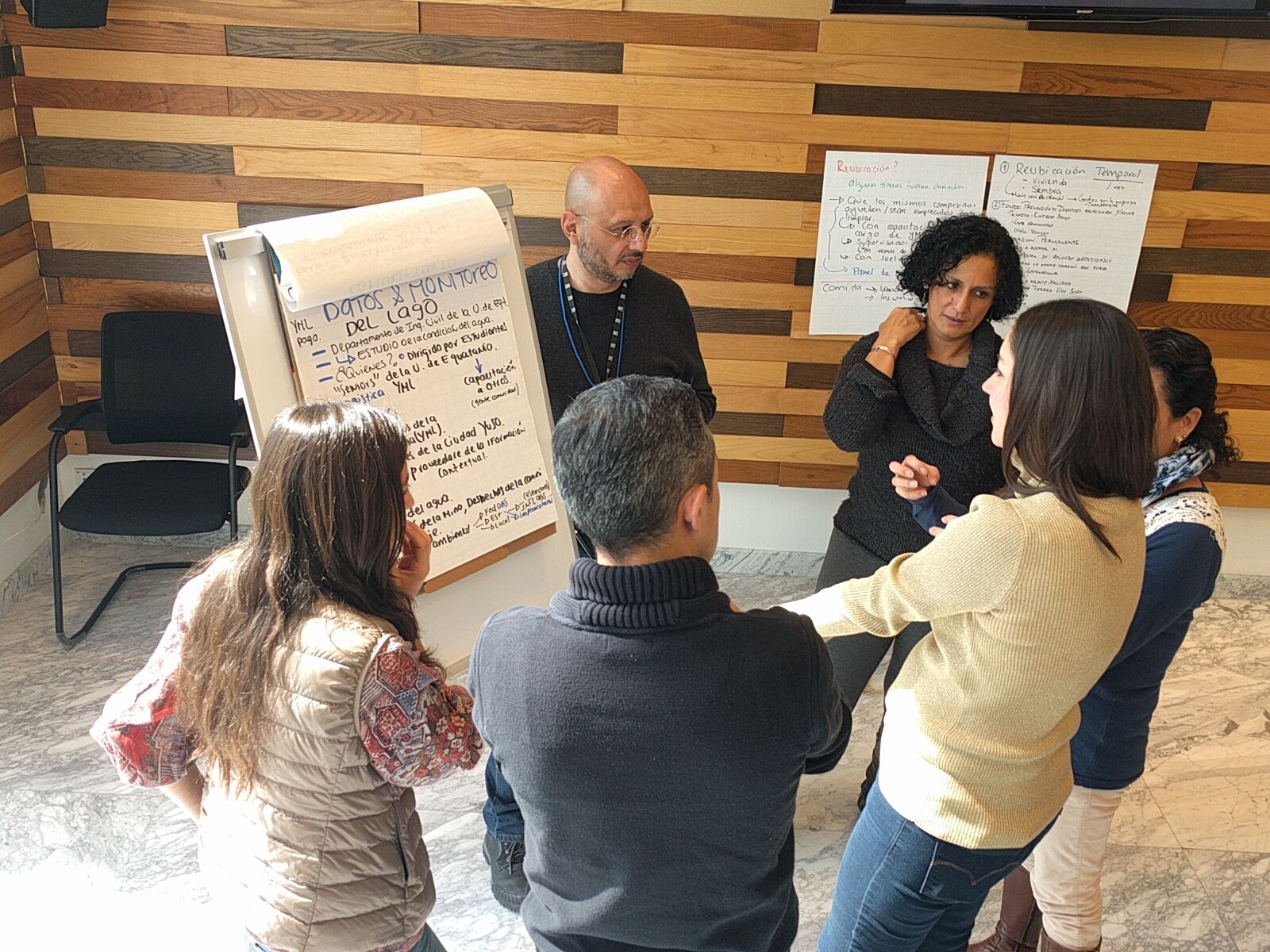
Capacity Building
Prof Ganson has taught negotiation, mediation, and conflict risk mitigation at Harvard University and other leading institutions in academic, executive education, and team building formats. His interventions help companies, communities, governments, and development actors to implement systems for conflict prevention and resolution at the local, national, and international levels.
Customisable Courses
Company Community Mediation for Complex Environments develops mediators—and also leaders and board members of companies in complex environments, investors, community relations officers, community representatives, human rights advocates, environmental & social risk managers, and government officials—who can understand, prevent and resolve company-community conflict. Materials are available in English and Spanish.
Negotiation Leadership combines exploration of barriers to conflict resolution with strategic approaches to overcoming these. It builds a leader’s potential to lead interest-based problem-solving in ways that reduce destructive conflict and increase collaborative potential between individuals and organizations, at the same time conscious of the imperative to contribute to more positive society-wide dynamics.
Diplomacy in Complex Systems defines “diplomacy” broadly to encompass catalysing efforts by leaders across sectors who share the challenge of accountability for results without control over sufficient resources or actors to achieve success—and who, consequentially, must recognise, harmonise, and manage tensions between their own and others’ agendas and efforts in order to mobilise coalitions for positive change.
Teaching Materials Freely Available for Use
Management in Complex Environments: Questions for Leaders (2013) is free to download as an e-book. It draws from the insights of experts and business leaders. It shows how the discipline of asking questions helps them to navigate substantial risks and challenges, grow businesses even in unexpected places, and work more effectively with local and national actors who at different times greet the company with welcome, indifference, suspicion, or hostility. In doing so it points to more thoughtful and rigorous strategies to meet a company’s full range of goals—technical, financial, legal, reputation and social—even in the most complex markets. It includes numerous case studies and reflections from practice.
A series of case studies for the Global Child Forum explore how companies have built leadership awareness and operational capacity to address children's rights and other child related issues. Those by Prof Ganson include the following:
Confronting history, engaging the future: Hydro Brazil’s journey towards social sustainability;
From Promise to Performance: Stora Enso’s Journey towards Mitigating Child Labour.
Resolving Labour Issues in the Electronics Industry in Mexico follows the engagement of the advocacy organisation Centre for Reflection and Action on Labour Issues (CEREAL) with the National Chamber of the Electronic, Telecommunications and Information Technologies Industry (CANIETI) in Mexico over almost ten years, allowing for reflection on the possibilities and challenges of addressing parties’ fundamental concerns—particularly those related to structural issues—through consensual processes.
Building Community-Centred Stakeholder Engagement: A Conflict Resolution Approach explains why communities that intend to keep their own vision and voices at the centre of engagement with companies, governments, and others over long periods of time must develop and institutionalise their own capacities for collaborative analysis, political mobilisation, and conflict resolution—and how they might do so.
For a more complete list of materials, see Prof Ganson's ORCID profile
International Standards of Corporate Performance
International Standards of Corporate Performance: An Overview provides a brief introduction to the growing body of international law, national regulation, and contractual and voluntary commitments that impose on companies obligations intended to protect the interests of communities and other stakeholders affected by their operations.
An accompanying online test allows individuals to assess their knowledge of these standards. It is test to learn: the correct answer is provided after every response. It is a freely available resource.
Download Biography
E-mail Brian@Ganson.org

